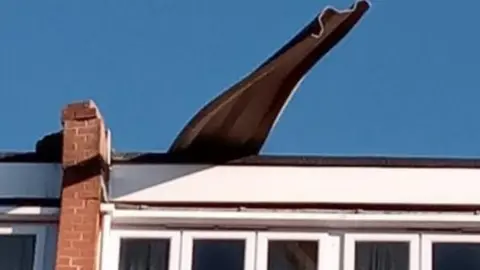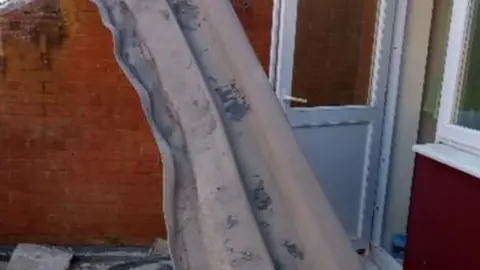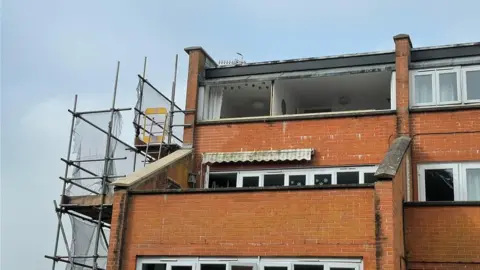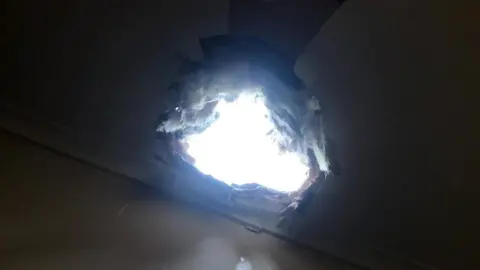Exeter WW2 bomb: Students to return in 'coming days'
 Devon and Cornwall Police
Devon and Cornwall PoliceHundreds of students evacuated after a World War Two bomb was found are expected to return "in the coming days", according to Exeter University.
Doors and windows of nearby buildings were damaged in a controlled explosion of the bomb in Exeter on Saturday.
Vice chancellor Lisa Roberts said there was still "work on windows and doors and tidying up" to be done on student accommodation.
She said 300 of the 1,400 students evacuated were still waiting to return.
The 2,200lb (1,000kg) German bomb was discovered on an allotment due for development on Friday.

The detonation sent huge steel girders designed to subdue the explosion into the air.
Doors of nearby homes were left hanging on their hinges, windows were blown out and brickwork was damaged by flying debris.
Ms Roberts said the university had put evacuated students up in hotels and other accommodation.
She said the university "empathised" with students unable to return and the university was "fully committed to ensuring that they get through their educational journey without any interruptions".

Student Emily Parker said she had been "struggling to learn" after being evacuated on Saturday.
"I left all my books behind in my university room and really can't concentrate on doing work when I don't know anything about the status of my university room," she said.
Bomb disposal experts say they had no choice but to detonate the bomb because the fuse was so corroded they could not tell what type it was, or if it had been booby trapped.

Exeter City Council has lifted the safety cordon to allow residents to return to their properties but it said many "will be uninhabitable at this stage".
A spokesman said: "It will now be down to these residents to return to their properties and contact their own insurance companies to make any further arrangements."

Exeter Labour MP Ben Bradshaw said the government could be liable for repairs.
He said it was "really important that the government clarifies the issue of liability as soon as possible" to avoid "years and years of potential wrangling over who is going to foot the bill".
The Home Office has been asked to comment.
Bomb disposal teams destroyed the device in a 400-tonne "box" of sand just before 18:15 GMT on Saturday in an explosion heard up to five miles (8km) away.
The city was heavily attacked by German bombers in 19 raids during World War Two, which saw more than 7,000 devices dropped, particularly in May 1942 during the Baedecker Raids.


Did you witness the detonation? Are you staying away from your home because it was evacuated? Tell us your story by emailing: [email protected].
Please include a contact number if you are willing to speak to a BBC journalist. You can also get in touch in the following ways:
- WhatsApp: +44 7756 165803
- Tweet: @BBC_HaveYourSay
- Upload your pictures/video here
- Or fill out the form below
- Please read our terms & conditions and privacy policy
If you are reading this page and can't see the form you will need to visit the mobile version of the BBC website to submit your question or comment or you can email us at [email protected]. Please include your name, age and location with any submission.

Follow BBC News South West on Twitter, Facebook and Instagram. Send your story ideas to [email protected].
